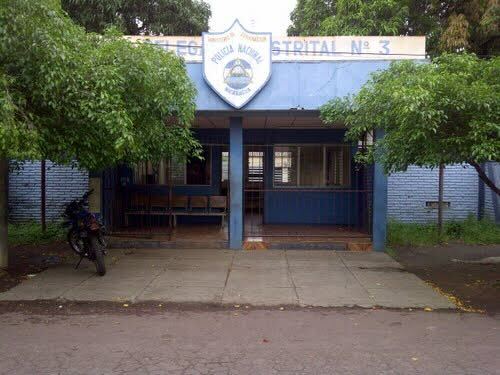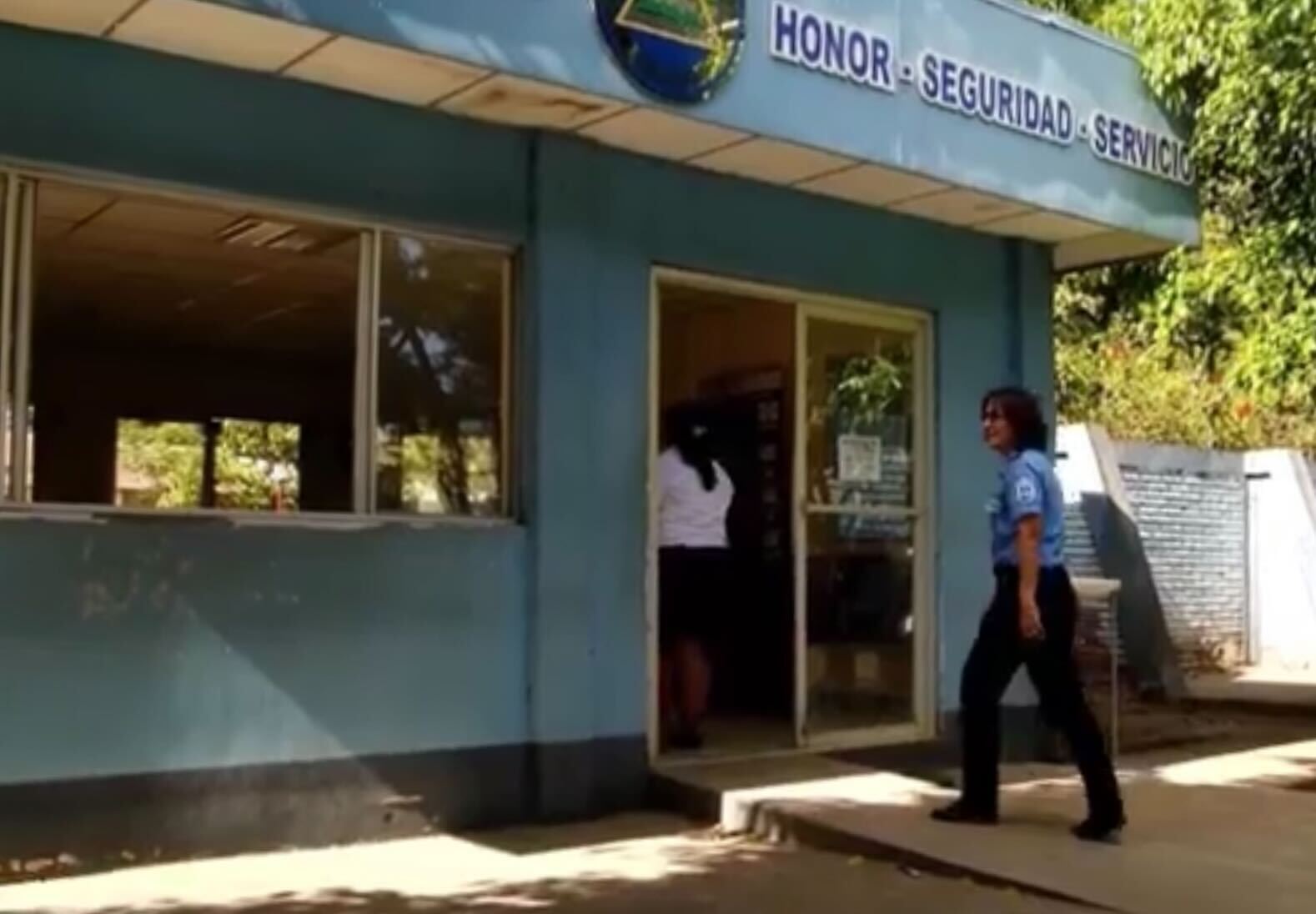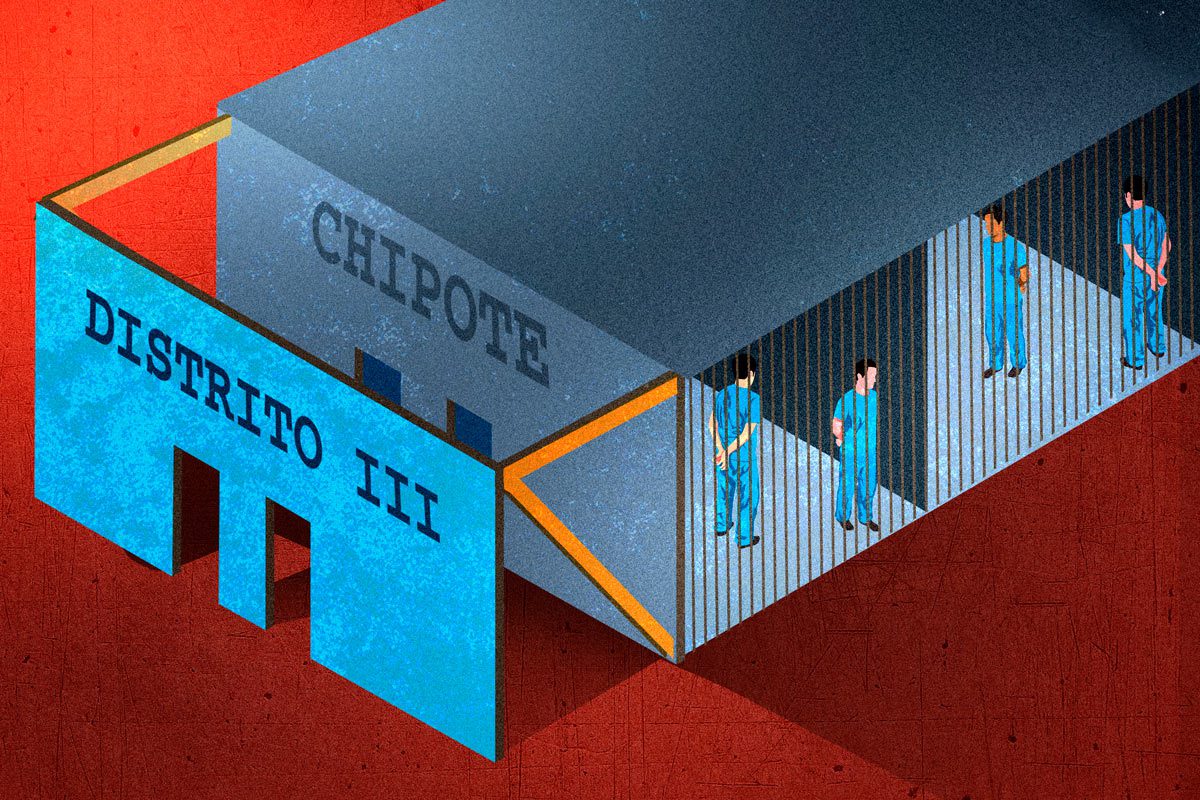The Ortega and Murillo dictatorship ordered the National Police that any Nicaraguan citizen who opposes its regime and protests within the country must be investigated and sent to the District Three police station in Managua and not to the Judicial Assistance Directorate (DAJ), better known as “El Chipote”, as had been done until the end of 2022. The aim of this, according to a source linked to the Police, is to reduce pressure on torture allegations in “El Chipote”, which have been reported by political prisoners.
District Three is a delegation that “is not common” nor “similar to the others”. “It functions as a façade as long as it is not known that the District Three police station was the predecessor of the Judicial Assistance Directorate. During the eighties this station was known as “Palo Alto”, explained the source consulted by DIVERGENTES who requested anonymity for safety reasons.
The last opponents who were held in the cells of District Three were Olesia Muñoz, a former political prisoner from Niquinohomo, Jasson Salazar, vice-president of the April 19 Movement and Víctor Ticay, correspondent of Canal 10 in Nandaime, Granada. They all went through the detention and investigation process in this delegation and it was not until the regime found them guilty of “undermining national integrity” and “propagation of false news”, that they were sent to La Modelo Penitentiary System, and La Esperanza, both located in Tipitapa.
Before, in November 2022, Miguel Flores and Mildred Rayo, both members of the Alianza Universitaria Nicaragüense (AUN), were captured, investigated and held in the same delegation. The youth organization reported that they had been arrested near the Sapoá River in Cárdenas, Rivas.
The Mechanism for the Recognition of Political Prisoners noted, in a report published in May 2023, that Brenda Lee Baldelomar Alemán, Anielka Lucía García Zapata and Abdul Montoya Vivas were also held in the same delegation.
“Unlike other police stations, the one in District Three, operatively speaking, has more capacity to fulfill the same functions as ‘El Chipote’. And it is built to hold more prisoners,” explained the source linked to the police.
The delegation, according to the same source, has several access points and is in line with the idea that the regime intends to promote that “it is not the same to be in the three”, a “common” delegation than in “El Chipote”, where prisoners are tortured and isolated.
Palo Alto: the predecessor to “El Chipote”.

Before the Judicial Assistance Directorate existed, the Sandinista government of the eighties, decided to set the police function as the protection of national order and the defense of sovereignty. Hence, the Sandinista Police was born, defined as an armed civilian force under the Interior Ministry, directed by Tomás Borge.
The Sandinista police grew within the Interior Ministry (as a security organ of the political party) and was governed by police regulations of 1880 until 1980, when Decree 559, Law of Jurisdictional Functions of the Sandinista Police, which regulates the activity of the police institution, was issued. It kept the offices that had been created for investigative and prosecutorial interests.
One of the divisions created by the Sandinista Police was the Directorate of Procedural Operations of the Police, which is one of the structural antecedents to the DAJ. This operated in what is now the District Three Delegation and was known at that time as Palo Alto.
According to the source linked to the police, any person of interest to the Sandinista Front was prosecuted in Palo Alto. They were also investigated and imprisoned until important information was obtained that “helped” them win the war against the Contras.
“At that time the same actions that have occurred in the last five years took place in the Judicial Assistance Directorate (Palo Alto). It was a reference to everyone at that time and did not go unnoticed,” added the security expert consulted.
The Police continued to develop the same actions in Palo Alto for many years, until 2002, with the enforcement of the Nicaraguan Code of Criminal Procedure (CPP). This Code considered the police institution as an auxiliary of Justice, and the National Criminal Investigation Unit was reorganized and the Directorate of Procedural Operations was added to finally end up as the Directorate of Judicial Assistance.
“With this restructuring that caused the emergence of the DAJ, District Three was the only delegation with structural and operational characteristics to continue developing the same work as in the eighties. Although the Police set up a Judicial Assistance office in other departments and districts, none of them had the capacities of District Three,” said the security expert.
According to the source, although the DAJ had its own office in Managua, operations similar to those of “El Chipote” continued to take place in District Three, to a lesser extent. However, these were not directed against opponents of the regime, but against organized crime figures.
“The exile of 222 political prisoners in February was important to understand the following actions (to reduce the pressure of a torturing dictatorship) of the regime. International pressure decreased a little and they understood that without prisoners in ‘El Chipote’, which is the torture center par excellence, the focus was going to shift and that is what has happened so far”, analyzed the security expert.
“That is why many political detainees are now transferred to Tres and not to ‘El Chipote’. It is not that they softened measures against political prisoners, they are just avoiding the DAJ reputation and are taking them to a delegation that has the same special detention conditions, but that people do not know about”, said the source.
Selling a false “hope

An article published by Confidencial in June confirmed that at least 30 opponents, including those mentioned above, were held in Palo Alto until June 9th. The men were transferred to La Modelo Penitentiary System, and the women to La Esperanza.
“The prisoner’s transfer was done under total secrecy. The Police did not notify the political prisoners’ relatives, who went to the respective prisons to verify if they had been admitted”, states the note.
Gonzalo Carrión, member of the Human Rights Collective Nicaragua Nunca +, expressed that with the imprisonment of opponents in District Three, the regime intends to silence torture reports made by political prisoners’ relatives, under the argument that if they do not speak to the media, their relatives will remain in those cells and not in other torture cells.
“The number of complaints has dropped. We have identified that the detainees and their relatives, in order not to be transferred to ‘El Chipote’, do not say anything about the situation they are going through. However, they do not realize that their detention continues to be arbitrary and unconstitutional,” said Carrión.
The human rights defender stated that, although “El Chipote” is known as the main torture center, this does not mean that in District Three and other police stations there are no rights violations against opponents. Carrion emphasized that torture is not exclusive to the DAJ, but is a State policy.
As to whether this move of the regime is a façade or not, Carrion indicated that for political prisoners this is relative, since in any police station their rights can be violated. However, he agrees with the security expert and the source linked to the Police that, indeed, the torture nature of “El Chipote” is not found in any other police station, despite the fact that these crimes are committed.





